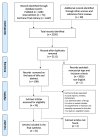Plant Foods Rich in Antioxidants and Human Cognition: A Systematic Review
- PMID: 33946461
- PMCID: PMC8147117
- DOI: 10.3390/antiox10050714
Plant Foods Rich in Antioxidants and Human Cognition: A Systematic Review
Abstract
Oxidative stress can compromise central nervous system integrity, thereby affecting cognitive ability. Consumption of plant foods rich in antioxidants could thereby protect cognition. We systematically reviewed the literature exploring the effects of antioxidant-rich plant foods on cognition. Thirty-one studies were included: 21 intervention, 4 cross-sectional (one with a cohort in prospective observation as well), and 6 prospective studies. Subjects belonged to various age classes (young, adult, and elderly). Some subjects examined were healthy, some had mild cognitive impairment (MCI), and some others were demented. Despite the different plant foods and the cognitive assessments used, the results can be summarized as follows: 7 studies reported a significant improvement in all cognitive domains examined; 19 found significant improvements only in some cognitive areas, or only for some food subsets; and 5 showed no significant improvement or no effectiveness. The impact of dietary plant antioxidants on cognition appears promising: most of the examined studies showed associations with significant beneficial effects on cognitive functions-in some cases global or only in some specific domains. There was typically an acute, preventive, or therapeutic effect in young, adult, and elderly people, whether they were healthy, demented, or affected by MCI. Their effects, however, are not attributable only to anti-oxidation.
Keywords: aging; antioxidants; cognition; cognitive impairment; flavonoids; neurodegeneration; oxidative stress; phytochemicals; polyphenols.
Conflict of interest statement
The authors declare no conflict of interest.
Figures
References
-
- Harrison S.L., Birdi R., Smart C.O., Brittain K., Rutjes A.W., Siervo M., Stephan B. Dietary Interventions for Maintaining Cognitive Function in Cognitively Healthy People in Mid Life. Cochrane Database Syst. Rev. 2015 doi: 10.1002/14651858.CD011911. - DOI
-
- Vauzour D., Camprubi-Robles M., Miquel-Kergoat S., Andres-Lacueva C., Bánáti D., Barberger-Gateau P., Bowman G.L., Caberlotto L., Clarke R., Hogervorst E., et al. Nutrition for the Ageing Brain: Towards Evidence for an Optimal Diet. Ageing Res. Rev. 2017;35:222–240. doi: 10.1016/j.arr.2016.09.010. - DOI - PubMed
-
- Pistollato F., Iglesias R.C., Ruiz R., Aparicio S., Crespo J., Lopez L.D., Manna P.P., Giampieri F., Battino M. Nutritional Patterns Associated with the Maintenance of Neurocognitive Functions and the Risk of Dementia and Alzheimer’s Disease: A Focus on Human Studies. Pharmacol. Res. 2018;131:32–43. doi: 10.1016/j.phrs.2018.03.012. - DOI - PubMed
Publication types
LinkOut - more resources
Full Text Sources
Other Literature Sources


